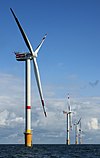Related Research Articles

The International Union for Conservation of Nature (IUCN) is an international organization working in the field of nature conservation and sustainable use of natural resources. Founded in 1948, IUCN has become the global authority on the status of the natural world and the measures needed to safeguard it. It is involved in data gathering and analysis, research, field projects, advocacy, and education. IUCN's mission is to "influence, encourage and assist societies throughout the world to conserve nature and to ensure that any use of natural resources is equitable and ecologically sustainable".

The Pacific Community (PC), formerly the South Pacific Commission (SPC), is an international development organisation governed by 27 members, including 22 Pacific island countries and territories around the Pacific Ocean. The organisation's headquarters are in Nouméa, New Caledonia, and it has regional offices in Suva, Pohnpei, and Port Vila, as well as field staff in other locations in the Pacific. Its working languages are English and French. It primarily provides technical and scientific advice, and acts as a conduit for funding of development projects from donor nations. Unlike the slightly smaller Pacific Islands Forum, the SPC is not a trade bloc, and does not deal with military or security issues.

In the United Kingdom, regional development agencies (RDAs) were nine non-departmental public bodies established for the purpose of development, primarily economic, of England's Government Office regions between 1998 and 2010. There was one RDA for each of the NUTS level 1 regions of England. Similar activities were carried out in Wales by the Welsh Government Department of Economy and Transport, in Northern Ireland by the Department of Enterprise, Trade and Investment and in Scotland by Scottish Enterprise and Highlands and Islands Enterprise.

The Carbon Trust was developed and launched in the UK over 1999-2001 as part of the development of the Climate Change Levy (CCL), a tax on business energy use that still operates today. The Carbon Trust was originally funded by around £50m of UK tax revenue generated from the Levy to help businesses reduce energy costs and therefore offset the additional cost of paying the CCL. The establishment of the Carbon Trust was announced in the 2000 UK White Paper "Climate Change - the UK Programme". It was launched alongside the introduction of the CCL in March–April 2001.
A social enterprise is an organization that applies commercial strategies to maximize improvements in financial, social and environmental well-being. This may include maximizing social impact alongside profits for co-owners.

Agoria, previously known as Fabrimetal, is a Belgian employers' organization and member of the Federation of Belgian Enterprises.
SciDev.Net is a not-for-profit organisation that produces news, views and analysis about science and technology in the context of global development. It primarily engages with development professionals, policymakers, researchers, the media and the informed public.
The Deutsche Gesellschaft für Internationale Zusammenarbeit (GIZ) GmbH, often simply shortened to GIZ, is the main German development agency. It is headquartered in Bonn and Eschborn and provides services in the field of international development cooperation and international education work. The organization's self-declared goal is to deliver effective solutions that offer people better prospects and sustainably improve their living conditions.

The South West Regional Assembly (SWRA) was the regional chamber for South West England, established in 1999. It was wound up in December 2008. Its functions were taken on by the Strategic Leaders' Board, the executive arm of the newly established South West Councils.
Interreg is a series of programmes to stimulate cooperation between regions in and out of the European Union (EU), funded by the European Regional Development Fund. The first Interreg started in 1989. Interreg IV covered the period 2007–2013. Interreg V (2014–2020) covers all 27 EU member states, the EFTA countries, six accession countries and 18 neighbouring countries. It has a budget of EUR 10.1 billion, which represents 2.8% of the total of the European Cohesion Policy budget. Since the non EU countries don't pay EU membership fee, they contribute directly to Interreg, not through ERDF.
The Bremen Overseas Research and Development Association (BORDA) is a non-profit international development organization headquartered in Bremen, Germany, and regional offices in Afghanistan, India, Indonesia, Mexico, and Tanzania as well as several project offices within each region. BORDA began its work in 1977, starting with its first project, “Technology Transfer of Biogas India-Ethiopia.” Since then it has been active in the delivery of basic needs services across the developing world.

The Leeds City Region, or informally Greater Leeds, is a local enterprise partnership city region located in West Yorkshire, England. Prior to the West Yorkshire devolution deal, the partnership covered parts of South and North Yorkshire. According to the Office for National Statistics, as of 2017 the city region ranked 2nd behind Greater London for both population and GVA in the United Kingdom. It has a population of 2,320,214 million and a GVA of £69.62 billion.
The Green Power Forum was an English group created by companies in the renewable energy sector to assist organisations and businesses in becoming more energy efficient.

University of Buea (UB) is found in Molyko, Buea, in the southwest region of Cameroon. It was founded as a university centre in 1985 and became a full-fledged university in 1992, following a government decree that re-organized state universities in the country. It is regarded as the best university in Cameroon and is one of two English speaking universities in Cameroon, alongside the University of Bamenda, which follow the British system of education. It serves citizens from both anglophone and francophone regions of Cameroon and from neighboring countries such as Nigeria and Equatorial Guinea.
WREN is a major non-profit organization registered in the United Kingdom with charitable status and affiliated to UNESCO, the Deputy Director General of which is its honorary President. It has a Governing Council, an Executive Committee and a Director General. It maintains links with many United Nations, governmental and non-governmental organisations.
The North East of England Process Industry Cluster (NEPIC) is an economic cluster developed in accordance with Michael Porter's theories and strategies regarding industrial clusters. The chemistry-using sectors in North East England, where more than 1,400 businesses are headquartered in the industry's supply chain, formed this Process Industry Cluster. In the north-east of England, the industry employs approximately 35,000 direct workers and around 190,000 indirect workers, who collectively account for more than one-third of the area's industrial economy. Companies in the cluster produce 35% of the pharmaceuticals and 50% of the petrochemicals used in the UK, making this area the only net exporter of goods from the country. The area has more than £13 billion in exports.

BRGM is France's public reference institution in Earth Science applications for the management of surface and subsurface resources and risks. It is the French Geological Survey.
Science and technology is Jordan's growing economic sector. This growth is occurring across multiple industries, including information and communications technology (ICT), solar and wind energy and nuclear technology.
Science and technology in Kazakhstan – government policies to develop science, technology and innovation in Kazakhstan.
Science and technology in Uzbekistan examines government efforts to develop a national innovation system and the impact of these policies.
References
- ↑ "Envirolink Northwest collapses into liquidation". Manchester Evening News. Retrieved 10 April 2013.
- ↑ Envirolink Background
